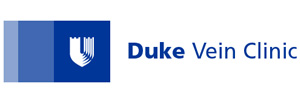
Varicose veins, which are common in the adult population, appear as ropy or cord-like, twisted veins at the surface of the skin. The word “varicose” comes from the Latin word “varix,” which means twisted. Varicose veins occur as blood collects in the veins due to vein damage or improper functioning of the one-way valves within the veins. As blood accumulates and the veins swell, they can become twisted, inflamed, or gnarled, leading to an undesirable appearance and in many cases, pain. Since varicose veins occur because of improper circulatory blood flow, they sometimes suggest, or can lead to, more serious cardiovascular problems.
While varicose veins most commonly occur in the legs – anywhere from your groin to your ankle – they may occur elsewhere on the body as well. Mild cases are usually not a problem and people may not experience any discomfort. However, many of the Raleigh-Durham area patients coming to the Duke Vein Clinic have feelings of fullness, aching, heaviness, or pain in their legs as a result of their varicose veins. As more and more blood flows backwards and accumulates in the diseased veins, the veins can sometimes begin to leak, causing leg swelling and aches. Burning and throbbing can occur as blood begins to pool and back up into your legs. Other symptoms include visible, enlarged veins; swelling of the ankles or legs; skin discolorations; and/or skin ulcers.
Varicose veins associated with pain, burning, or other symptoms usually require treatment. In some of the most severe cases, patients require surgery such as vein stripping. However, there are several non-invasive treatments to consider as well. Sclerotherapy can be used to treat smaller varicose veins, while larger varicose veins many need procedures such as endovenous laser ablation, radio frequency ablation, cutaneous laser treatment, or ambulatory phlebectomy.
Click here for additional information on minimally-invasive procedures for varicose veins offered by the Duke Vein Clinic.
If you have unattractive and/or painful varicose veins, and are seeking vein treatment in the greater Raleigh-Durham area, we invite you to come in and discuss treatment options with one of our experienced physicians today. We are just a short drive away from most anywhere in the Research Triangle region, including Cary, Chapel Hill, Burlington, Elon, Graham, Hillsborough, Oxford, Henderson, Wake Forest, Knightdale, Clayton, Garner, Apex, Zebulon, and Benson.

